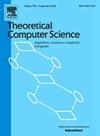The contest game for crowdsourcing reviews
IF 1
4区 计算机科学
Q3 COMPUTER SCIENCE, THEORY & METHODS
引用次数: 0
Abstract
We consider a contest game with discrete strategies, modelling a contest where reviews for a proposal are crowdsourced from n players. Player i has a skill , strategically chooses a quality for her review and pays an effort , strictly increasing with q. Under voluntary participation, a player may opt to not write a review, paying zero effort; mandatory participation excludes this option. For her effort, she is awarded a payment per her payment function, which is either player-invariant, like, e.g., the popular proportional allocation, or player-specific; it is oblivious when it does not depend on the loads on other qualities. The utility to player i is the difference between her payment and her cost, calculated by a skill-effort function . Skills may vary for arbitrary players; when players are anonymous, for each player i. In a pure Nash equilibrium, no player could increase her utility by unilaterally switching to another quality. We show the following results about the (in)existence and the computation of a pure Nash equilibrium:
- •A contest game with arbitrary players and player-invariant and oblivious payments is an unweighted congestion game with player-specific constants on parallel links [42]; so it has a generalized ordinal potential, the Finite Improvement Property (FIP) and a pure Nash equilibrium, which can be computed in . However, under the assumption that the payment function is monotonically nonincreasing, a pure Nash equilibrium can be computed efficiently by resorting to [44, Theorem 2].In contrast, a pure Nash equilibrium might not exist for (i) anonymous players and player-invariant but not oblivious payments, (ii) arbitrary players and proportionally allocated payments, and (iii) anonymous players and player-specific and oblivious payments; in the latter case, it is -hard to decide existence even if players are anonymous. These counterexamples prove the tightness of our existence result and suggest that the decision and search problems for a pure Nash equilibrium are computationally hard.
- •Under some mild assumptions on the efforts, the contest game with anonymous players and proportional allocation has at least one Nash equilibrium. For arbitrary players, we identify a simple condition involving both skills and efforts that suffices for the existence of a pure Nash equilibrium in the special case where the skill-effort function has the product form . In both cases the pure Nash equilibrium is simple and computable in constant time.
- •Under the assumption that costs are player-consistent, there is a polynomial-time algorithm to decide the existence and compute a pure Nash equilibrium for constant Q, for the case of arbitrary players and player-invariant payments; so the computational problem is -tractable with respect to the parameter Q. Player-consistent costs means that all players are incurred the same relative costs for a given pair of qualities. The computed equilibrium is contiguous by design: players with higher skills are contiguously assigned to lower qualities.
众包评论的竞赛游戏
我们考虑一个具有离散策略的竞赛游戏,模拟一个竞赛,其中提案的评论来自n个参与者。玩家i的技能为si,策略性地选择品质q∈{1,2,…,q}作为评论,并付出努力fq≥0,并严格随q递增。在自愿参与的情况下,玩家可以选择不写评论,付出零努力;强制参与排除此选项。对于她的努力,她会根据她的付费功能获得奖励,这要么是玩家不变的,比如流行的比例分配,要么是玩家特定的;当它不依赖于其他品质的负荷时,它是遗忘的。玩家i的效用是其支付与成本之差,由技能-努力函数Λ(si,fq)计算。不同玩家的技能可能不同;当参与者是匿名时,si=1对应每个参与者i。在纯纳什均衡中,没有参与者可以通过单方面切换到另一种品质来增加自己的效用。我们证明了纯纳什均衡的存在性和计算的以下结果:•具有任意玩家和玩家不变和遗忘支付的竞赛博弈是并行链路[42]上具有玩家特定常数的非加权拥塞博弈;因此,它具有广义有序势、有限改进性质(FIP)和一个纯纳什均衡,可以在PLS中计算。然而,在假设支付函数单调不增加的情况下,借助于定理2可以有效地计算出一个纯纳什均衡。相比之下,纯纳什均衡可能不存在于(i)匿名玩家和玩家不变但不遗忘的支付,(ii)任意玩家和按比例分配的支付,以及(iii)匿名玩家和特定玩家和遗忘的支付;在后一种情况下,即使玩家是匿名的,也很难决定是否存在。这些反例证明了我们的存在性结果的严密性,并表明纯纳什均衡的决策和搜索问题在计算上是困难的。•在对努力的一些温和假设下,具有匿名参与者和比例分配的竞赛博弈至少有一个纳什均衡。对于任意玩家,我们确定了一个涉及技能和努力的简单条件,在技能-努力函数具有乘积形式Λ(si,fq)=sifq的特殊情况下,该条件足以存在纯纳什均衡。在这两种情况下,纯纳什均衡都很简单,在常数时间内可计算。•在成本是玩家一致的假设下,对于任意玩家和玩家不变支付的情况,有一个多项式时间Θ(nQ)算法来确定存在性并计算常数Q的纯纳什均衡;所以关于参数q的计算问题是xp -可处理的,玩家一致的成本意味着所有玩家对给定的一对品质产生相同的相对成本。计算出的平衡是连续的:具有较高技能的玩家被连续分配到较低的技能。我们的结果表明,即使在最简单的情况下,纯纳什均衡的决策和搜索问题也可能很难计算,但即使在最困难的情况下,通过采用简单的努力、支付或成本假设,无论参与是强制性的还是自愿的,都可以使问题变得容易。
本文章由计算机程序翻译,如有差异,请以英文原文为准。
求助全文
约1分钟内获得全文
求助全文
来源期刊

Theoretical Computer Science
工程技术-计算机:理论方法
CiteScore
2.60
自引率
18.20%
发文量
471
审稿时长
12.6 months
期刊介绍:
Theoretical Computer Science is mathematical and abstract in spirit, but it derives its motivation from practical and everyday computation. Its aim is to understand the nature of computation and, as a consequence of this understanding, provide more efficient methodologies. All papers introducing or studying mathematical, logic and formal concepts and methods are welcome, provided that their motivation is clearly drawn from the field of computing.
 求助内容:
求助内容: 应助结果提醒方式:
应助结果提醒方式:


